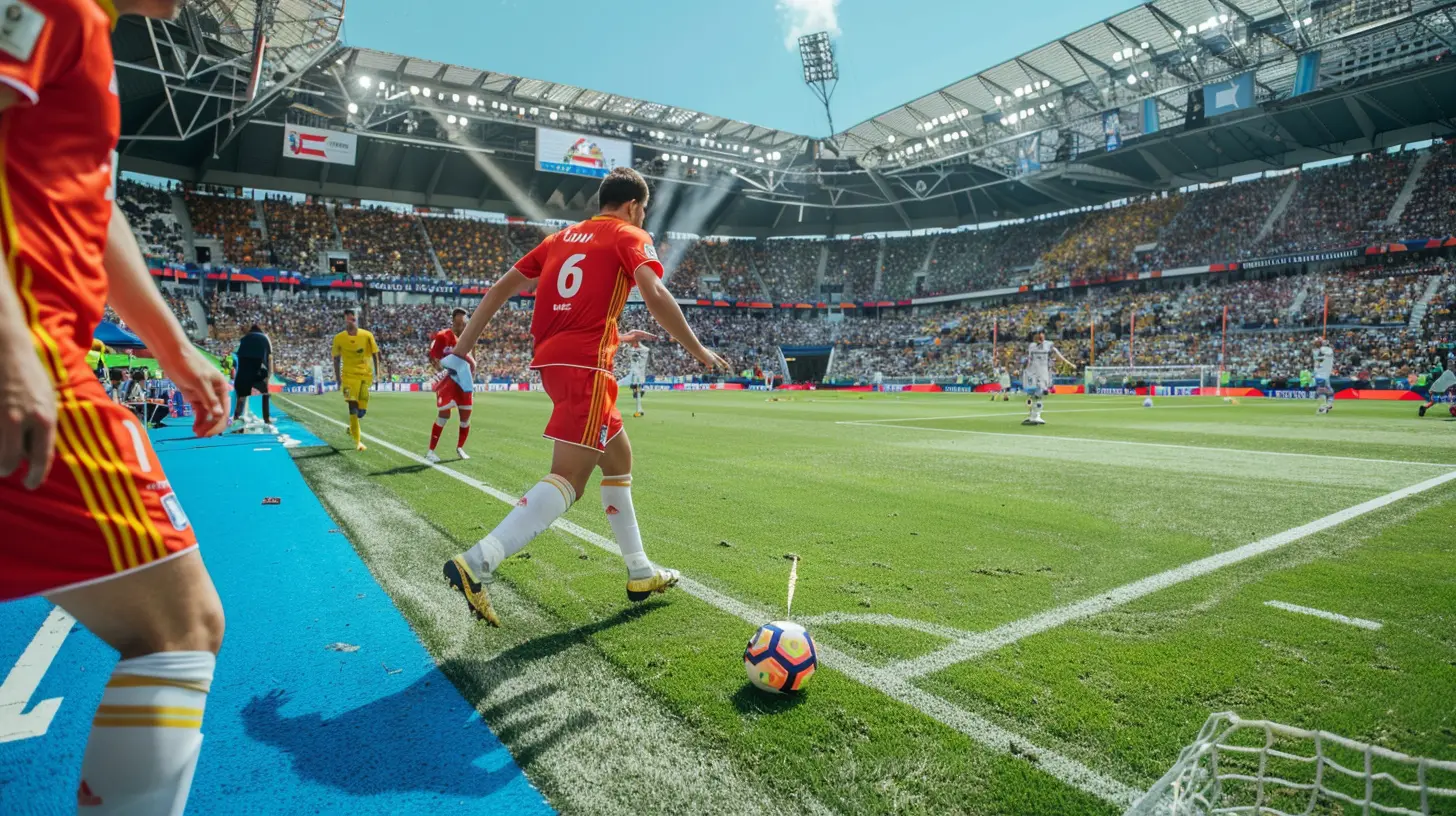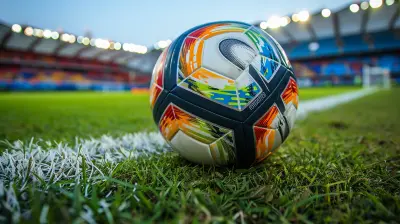How the Referee’s Decisions Impacted the Flow of the Game
24 January 2025
When it comes to sports, particularly football, the referee is the ultimate decision-maker on the field. Their role, while often underappreciated, is absolutely crucial. You might not always agree with them, and sometimes their decisions may leave fans (and players) scratching their heads or pulling their hair out in frustration. But one thing is certain – the referee’s decisions significantly impact the flow of the game.
In a high-energy, fast-paced environment like a football match, the referee's whistle can either add to the momentum or stall it completely. This isn’t just about calling fouls or issuing cards; it’s about their overall control of the game, their consistency, and how they manage critical moments. Let’s dive a bit deeper into how the referee’s decisions influence the tempo, rhythm, and overall experience of the match.

The Role of the Referee: More Than Just Blowing the Whistle
Before we jump into how decisions impact the flow of the game, let’s take a moment to appreciate the complexity of the referee’s job. You’re out there on the pitch, with 22 players running around, the crowd roaring, and millions watching at home. Every moment counts, and every call is being scrutinized by fans, pundits, and players alike.Referees need to be sharp, focused, and impartial. They have to make split-second decisions that could change the entire course of the game. Whether it’s a delicate offside call, a crucial penalty decision, or determining whether an infraction deserves a yellow or red card, the referee is the gatekeeper of fairness. But here’s the catch – their decisions don’t just uphold the rules; they shape the game’s rhythm.

Stopping the Flow: Whistles, Free-kicks, and Fouls
One of the most obvious ways a referee impacts the flow of the game is by stopping it. The moment that whistle blows, the game comes to a sudden halt. And let’s be real – nothing kills momentum faster than a stoppage. Imagine a team is on a fast break, racing down the field, the defenders scrambling to get back, the crowd on their feet… and then, peep, the ref blows his whistle for a foul.Sure, sometimes it’s necessary. A reckless challenge or a handball can’t be ignored. However, when referees are too quick to blow the whistle for soft fouls or minor infractions, it can disrupt the natural flow of the game. This is especially frustrating for teams who rely on fast, counter-attacking football. Every time the play is stopped, the attacking team loses a bit of steam and the defending team gets a chance to regroup.
One of the most debated aspects is the “soft foul” – those calls where minimal contact leads to a free-kick. In some leagues, referees are more lenient, allowing the game to flow unless there’s clear intent or dangerous play. However, in other instances, refs may be overly cautious, calling fouls for the slightest contact. This creates a stop-and-go game that can frustrate both players on the pitch and fans in the stands.
The Psychological Impact of Early Yellow Cards
Now, let’s talk about game management. A referee’s decision to issue an early yellow card can have a huge impact on the flow of the game. Imagine a defender picking up a yellow card in the 10th minute. As a result, the player is suddenly walking on eggshells for the rest of the match. They’ll be less aggressive, less willing to challenge for the ball, and more cautious about their positioning. This can alter the team’s defensive strategy entirely.Early cautions can also affect the game’s overall intensity. Players might become more conservative, avoiding risky tackles, which can lead to a slower, more methodical pace. Alternatively, the team receiving the card might become overly aggressive, feeling unjustly targeted, and start committing more fouls, leading to more stoppages and breaking the flow even further.

Letting Play Continue: The Advantage Rule
On the flip side, one of the best tools a referee has to maintain the flow of the game is the advantage rule. This is when a foul occurs, but rather than stopping the play, the referee allows it to continue because the team that was fouled still has possession or a clear attacking opportunity.The advantage rule is brilliant because it rewards teams for maintaining control and punishes the fouling team by not giving them a chance to reset their defense. When used well, it keeps the game moving and adds to the excitement. However, it’s a tricky balance. If the referee waits too long to call it back or misjudges the situation, it can lead to confusion or missed opportunities.
A well-timed advantage call can be the difference between a dull, disjointed game and one that flows seamlessly from end to end. It’s a fine art, and referees who manage it well are often praised for their ability to let the game breathe.

VAR: The Flow Disruptor or Savior?
Ah, VAR (Video Assistant Referee). Few things divide football fans more than this piece of technology. While it was introduced to help referees make better decisions, it’s undeniable that VAR can disrupt the flow of the game. We’ve all seen it: the referee stops play, puts a finger to their ear, and waits for guidance from the VAR team. Meanwhile, players stand around, the crowd grows restless, and the tension builds.While VAR can correct clear and obvious errors, it can also lead to lengthy delays. These pauses can sap the energy out of the game and shift momentum. For example, a team might score a goal, only to have it ruled out minutes later after a VAR review. In those in-between moments, the emotional high of scoring is crushed, and the intensity of the match can drop.
However, there are times when VAR can actually improve the flow of the game. By quickly confirming a correct decision, it prevents players and managers from swarming the referee, demanding reviews. In this way, it can enhance fairness and reduce the number of complaints that stop play.
But let’s be real – no one enjoys waiting around for a decision, especially when it drags on for several minutes. For the sake of the game’s flow, quicker VAR decisions would definitely be a welcome improvement.
Consistency is Key: How Referees Impact the Game's Rhythm
One of the most common complaints you’ll hear from players, managers, and fans is about inconsistency in refereeing. A referee who is inconsistent with their calls can completely disrupt the flow of the game. If players aren’t sure what constitutes a foul or what level of physicality is allowed, they can become hesitant, second-guessing their every move.Consistency isn’t just about fouls, either. It’s about applying the same standard to both teams. When one team feels like they’re being unfairly targeted, it can lead to frustration, more stoppages, and even altercations. A game where the referee is constantly blowing the whistle for one side but letting the other play freely can feel disjointed and unfair.
A consistent referee, on the other hand, allows players to adapt to the game’s flow. They know what’s allowed and what isn’t, so they can adjust their style accordingly. This leads to a smoother, more free-flowing game where the focus is on the players’ skills rather than the referee’s decisions.
Red Cards: Game-Changers That Shift Momentum
Few things change the flow of a game more dramatically than a red card. When a player is sent off, the entire dynamic of the match shifts. The team with 10 men is forced to play more defensively, often parking the bus to protect their goal, while the team with 11 players suddenly finds themselves with more space and time on the ball.A red card can kill the flow of the game for the team that’s down a player. They’re no longer able to press or attack with the same intensity, leading to a more one-sided affair. Meanwhile, the team with the numerical advantage might start to dominate possession, but often struggle to break down a deep-lying defense.
Red cards are game-changers, not just because of the numerical disadvantage but because they completely alter the tactical landscape. The flow of the game slows down for one team and speeds up for the other, creating a new rhythm for the remainder of the match.
Stoppage Time: The Final Impact of Refereeing on Game Flow
Finally, let’s talk about stoppage time. Referees are responsible for determining how much time is added at the end of each half to account for stoppages like injuries, substitutions, and VAR reviews. This can have a huge impact on the flow of the game, especially if one team is desperately chasing a goal.If a referee adds too much stoppage time, it can feel like the game is dragging on unnecessarily. On the other hand, not adding enough time can rob a team of a chance to get back into the match. It’s a delicate balance, and referees need to be mindful of how their decisions in this regard can affect the outcome and flow of the game.
Conclusion: The Referee’s Influence on the Game’s Flow
Love them or hate them, referees have an undeniable impact on the flow of the game. From stopping play with their whistles to managing the advantage rule, issuing cards, and even consulting VAR, their decisions shape every aspect of the match.A well-officiated game allows for a smooth, exciting flow where the focus is on the players and their skills. However, inconsistent decisions, overly frequent stoppages, or lengthy VAR reviews can disrupt the rhythm, frustrating players and fans alike.
So, the next time you're watching a match and feel the momentum shift, take a moment to think about how much of that is down to the referee. They may not be the stars of the show, but their calls can make or break the flow of the game.
all images in this post were generated using AI tools
Category:
Post Match AnalysisAuthor:

Frankie Bailey
Discussion
rate this article
17 comments
Esther Sawyer
Oh, absolutely! Because we all know the referee’s decisions are the real stars of the game, right? Who cares about the players when we can dissect every whistle and hand signal like it’s a Shakespearean drama!
March 20, 2025 at 9:01 PM

Frankie Bailey
Thank you for your witty take! While players are undoubtedly central, referees significantly influence the game's dynamics, making their decisions worthy of analysis.
Chloe Bowers
Referees play a crucial role in shaping the game's dynamics, influencing momentum and strategy. While their decisions can spark debates, they ultimately challenge players to adapt and elevate their performance. Embracing these moments fosters resilience and sportsmanship, reminding us that every game is an opportunity for growth and teamwork!
February 6, 2025 at 8:16 PM

Frankie Bailey
Absolutely! Referees significantly influence the game, pushing players to adapt and grow, highlighting the importance of resilience and teamwork.
Lillian Cross
What an intriguing analysis! I'm curious to know—how do specific referee decisions shape player behavior and team strategies? It seems like a vital yet often overlooked aspect of game dynamics. Would love to hear more!
February 3, 2025 at 3:37 AM

Frankie Bailey
Thank you for your interest! Referee decisions significantly influence player behavior by shaping their risk-taking and aggression levels. Teams often adjust strategies based on perceived officiating patterns, such as anticipating fouls or exploiting leniency. This dynamic adds complexity to game flow and tactical planning.
Bianca Roberts
Referee decisions undeniably shape game dynamics, influencing player morale and strategies. While some calls may stir controversy, a fair assessment reveals that officiating is part of the unpredictable nature of sports, impacting both teams equally.
February 2, 2025 at 8:32 PM

Frankie Bailey
Absolutely, referee decisions are integral to the game, affecting not just the flow but also the players' mindset and strategies. It's a complex, dynamic aspect of sports that both teams must navigate.
Elias Kirkpatrick
Referee decisions directly shape the game's rhythm and momentum—undeniably crucial.
February 2, 2025 at 11:47 AM

Frankie Bailey
Absolutely, referee decisions are pivotal in influencing the game's tempo and overall momentum.
Mindy McMichael
Referee decisions shape not just the score but the game's spirit. A balanced approach fosters fair play, while questionable calls can disrupt momentum, highlighting the immense responsibility they carry.
February 2, 2025 at 5:50 AM

Frankie Bailey
Absolutely! Referee decisions are pivotal in maintaining the game's integrity and flow. Their calls can significantly influence momentum and the overall spirit of the match.
Jude Coffey
Referees may stir the pot, but they also spice up the game! Remember, every whistle can lead to unexpected twists and thrilling moments. Here’s to embracing the chaos and enjoying the beautiful unpredictability of sports!
February 1, 2025 at 9:08 PM

Frankie Bailey
Absolutely! Referees add an element of unpredictability that keeps the game exciting. Their decisions can create pivotal moments that shape the outcome. Embracing this chaos is part of what makes sports so thrilling!
Kaleb Nelson
Great article! Referees definitely shape the game’s rhythm. It’s fascinating how their calls can spark both excitement and frustration in fans.
January 31, 2025 at 11:36 AM

Frankie Bailey
Thank you! I completely agree—referees play a crucial role in shaping not just the game's flow, but also the emotions of everyone involved.
Maria Williams
Great analysis! Referee decisions often shape the game’s rhythm, and your insights highlight their significant role in influencing momentum and player strategy.
January 30, 2025 at 3:32 AM

Frankie Bailey
Thank you! I'm glad you found the analysis insightful. Referee decisions truly are pivotal in shaping both the game's flow and the strategies employed by players.
Runevale McCarty
Great article! Referees play a crucial role in shaping the dynamics of a match. It's intriguing to see how their decisions can significantly influence the game's overall flow and outcome.
January 29, 2025 at 8:17 PM

Frankie Bailey
Thank you! I'm glad you found it insightful. Referees truly do have a profound impact on the game's dynamics.
Brigitte Abbott
Referee decisions play a crucial role in shaping game dynamics. Their calls can disrupt momentum, influence player emotions, and alter tactical strategies, often determining the outcome and overall spectator experience. Consistency is key for fairness.
January 29, 2025 at 5:03 AM

Frankie Bailey
Thank you for your insightful comment! I completely agree that referees significantly influence game flow and overall fairness through their decisions. Consistency is indeed essential for maintaining the integrity of the match.
Lumen Blevins
Great insights! Refereeing can truly shape the game, influencing both players and fans profoundly.
January 28, 2025 at 4:07 AM

Frankie Bailey
Thank you! Absolutely, referees play a crucial role in shaping the dynamics of the game for everyone involved.
Dolores McCray
Referees wield immense influence over gameplay; inconsistent decisions can disrupt momentum and player morale, ultimately shaping the match's outcome. A call can become the game’s turning point.
January 27, 2025 at 9:39 PM

Frankie Bailey
Absolutely, referees play a crucial role in the flow of the game, and their decisions can indeed be pivotal in determining the match's outcome and affecting player morale.
Vienna Sharp
Referee decisions shape the game; they can elevate or frustrate momentum.
January 26, 2025 at 9:41 PM

Frankie Bailey
Absolutely, referee decisions play a crucial role in influencing the game's tempo and momentum, often swaying the outcome unexpectedly.
Vesperos Bennett
Great article! Your insights on how referee decisions shape the game's flow are spot-on. It's fascinating to see how their calls can influence not just the match, but the players and fans' emotions as well. Keep it up!
January 25, 2025 at 7:28 PM

Frankie Bailey
Thank you for your kind words! I'm glad you found the insights valuable. Referee decisions truly play a crucial role in shaping the game's dynamics. Appreciate your support!
Jordan Hines
Refereeing inconsistencies disrupted the game's rhythm.
January 24, 2025 at 9:40 PM

Frankie Bailey
I appreciate your insight! Refereeing inconsistencies can indeed disrupt the momentum and flow, affecting both teams' performances and overall game experience.
Onyx Davis
Whispers of bias linger in the air; could the referee's choices hold secrets beyond the scoreboard?
January 24, 2025 at 4:15 AM

Frankie Bailey
Great point! Referee decisions can indeed influence the game's dynamics and raise questions about potential biases.
MORE POSTS

Sports Books That Celebrate the Power of Perseverance

The Impact of Early Goals: How Fast Starts Shape Matches

The Importance of Gut Health in Athletic Performance: A Scientific Perspective

Midfield Dominance: How Control of the Center Sealed the Win

How Team A Outplayed Team B: A Tactical Masterclass

The Importance of Wide Play in Last Night’s Victory

The Role of a Coach in Injury Recovery and Preventing Burnout

How to Build a Winning Mindset in High School Athletics

How to Use Gym Machines vs. Free Weights for Maximum Gains

How Adaptive Sports Science is Empowering Athletes with Disabilities

How to Tackle Hills and Improve Your Running Strength